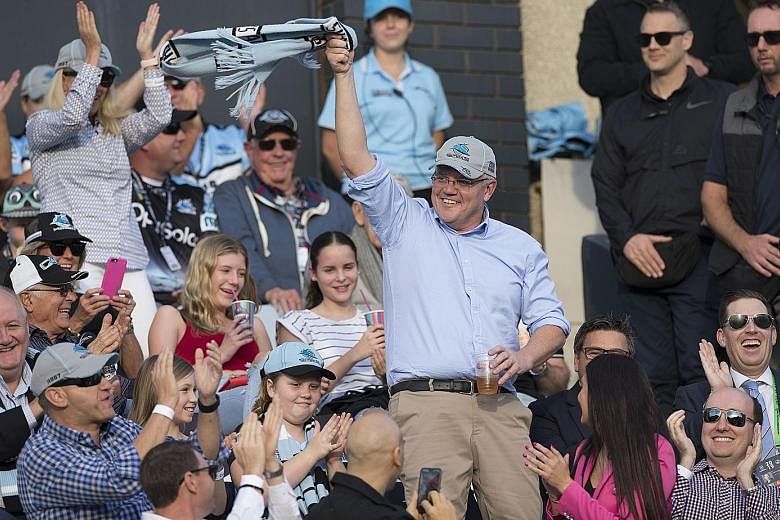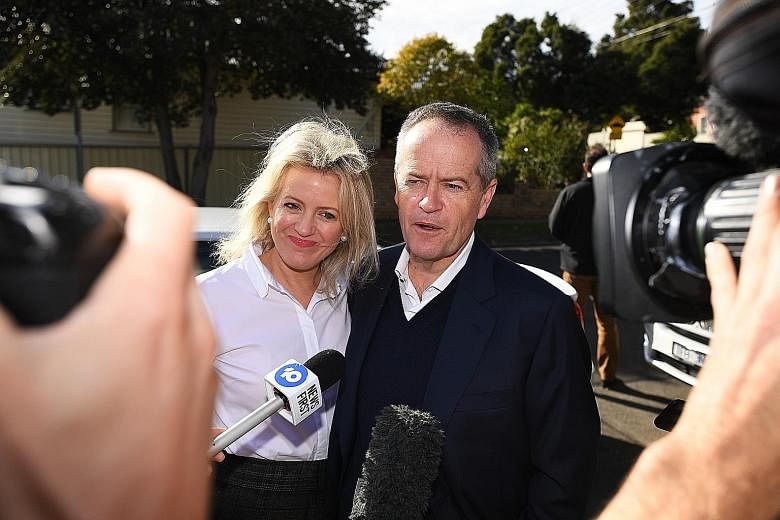Australian Prime Minister Scott Morrison celebrated his surprise election win yesterday as the ruling coalition edged closer to an outright majority that would help it to secure its tax plans and avoid adopting tougher climate change action.
Hours after declaring victory late on Saturday night, Mr Morrison attended a church service yesterday morning and was then greeted by cheering crowds as he went to a local rugby league match.
"I give thanks to live in the greatest country in all the world," he said. "Thanks again to all Australians all across the country."
With 76 per cent of the vote counted, Mr Morrison's Liberal-National Coalition had won 75 seats in the 151-member Lower House, just one short of an outright majority.
According to an ABC analysis, there are five seats that are too close to call, including two where the Liberal Party leads. Labor had secured 65 seats, independents five, and the Greens one.
Labor had been the clear favourite before the election but Australia's relatively strong economy and low unemployment - and a disciplined campaign by Mr Morrison - appeared to persuade voters that they should stick with the Coalition.
The Coalition signalled yesterday that its immediate priority was to secure its centrepiece policy - income tax cuts worth A$158 billion (S$150 billion) over the next decade.
-
PM Lee congratulates Aussie leader on re-election
-
Prime Minister Lee Hsien Loong has written to his Australian counterpart Scott Morrison to congratulate him on his Liberal-National Coalition's victory at the national election, the Ministry of Foreign Affairs said in a statement yesterday.
Mr Lee, in his letter, offered Mr Morrison his warmest congratulations on his re-election as Prime Minister and "the coalition's well-fought victory", saying that he looked forward to continue working with the Australian leader to strengthen ties.
Mr Lee noted that Singapore and Australia share a robust and longstanding relationship, with both countries cooperating closely across areas, including defence, trade, science and innovation, and people-to-people exchanges.
"Our Comprehensive Strategic Partnership has deepened significantly in recent years, and I look forward to continue working with you to strengthen existing links, and to explore new areas of collaboration, such as in the digital economy," Mr Lee said.
Ties between Singapore and Australia were elevated to a Comprehensive Strategic Partnership in 2015.
Mr Lee said that he hoped Mr Morrison would be able to visit Singapore officially this year to attend the annual Singapore-Australia Leaders' Summit and discuss these issues further.
"I wish you the very best of health and success, and look forward to seeing you soon," he said.
"Obviously, that is our priority piece of legislation, to provide the tax cuts for more than 13 million Australians as outlined in the Budget," Treasurer Josh Frydenberg told ABC News yesterday.
"The Labor Party has already said it will support that legislation, so it will have bipartisan support, so let us get this legislation passed so that the Australian people get their tax cuts."
However, Mr Frydenberg also indicated the government was unlikely to consider more effective plans to cut carbon emissions and boost cleaner energy, despite calls by some sitting and former Liberal MPs for stronger climate action. The Coalition has been heavily criticised for its low carbon emissions reduction targets and for insisting that it is on track to meet its internationally agreed levels, even though official data indicates it is not.
"We've set out our policy to the Australian people before the election," Mr Frydenberg said.
"(Labor leader) Bill Shorten got into a lot of trouble during this campaign when he couldn't explain how he would meet his targets, how much it would cost the economy. Our targets are costed, are funded and we've got the record of meeting and beating our previous targets."
The Coalition could come under pressure to adopt tougher action on climate change if it fails to secure a parliamentary majority. This would force it to rely on the support of independent MPs, several of whom had campaigned heavily on the need for a more effective national climate policy.
An independent, Ms Zali Steggall, who defeated former prime minister Tony Abbott in the seat he had held for 25 years, has welcomed the Coalition's commitment to the Paris climate agreement as a "starting point".
She told The Sydney Morning Herald yesterday: "Now, I probably disagree with the way in which (Mr Morrison) is going about it, or the speed at which he is, but at least we have the right starting point."
Labor's surprise loss has sparked debate about its direction and whether it would continue with its bold policy agenda, including significant cuts to carbon emissions and taxes aimed at property investors and high-income earners. Following Mr Shorten's announcement that he will resign as leader, several contenders have emerged to replace him, including former ministers Anthony Albanese, Tanya Plibersek and Chris Bowen.
In the 76-member Upper House, or Senate, the Coalition does not have a majority but improved its standing from 31 MPs to a likely 33 or 34. Labor is set to have 26 seats, the Greens will have nine, and the rest will go to minor parties. The Coalition will need to negotiate with the cross-bench to secure legislation.
Mr Morrison's next step will be to announce his new Cabinet. He is likely to retain his senior ministers but is under pressure to appoint more women to the frontbench. He has already said he will appoint Ms Linda Reynolds, a former brigadier in the Army Reserves, as defence minister.


